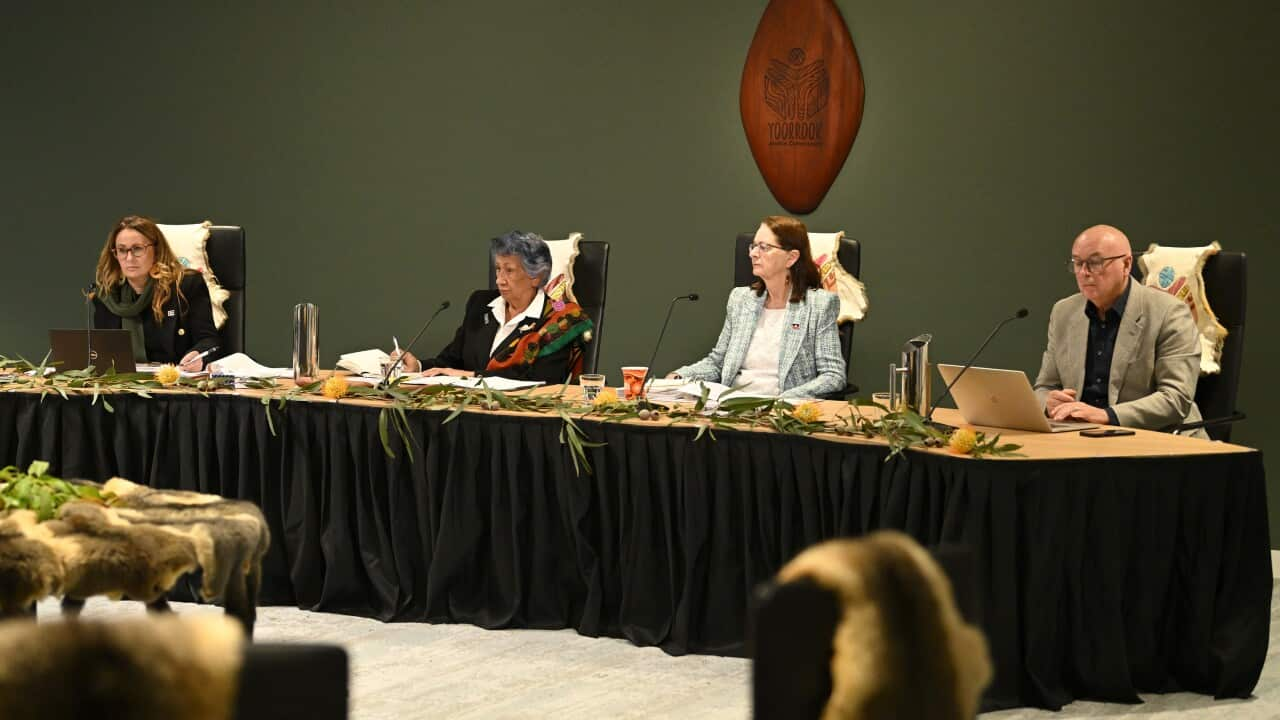TW: Distressing content
On this day fifteen years ago, Kevin Rudd delivered the National Apology to the Stolen Generations.
Aunty Priscilla Wightman was there.
"We went into the place where he was giving the speech. The moment he said 'sorry', he was eyeballing me," she said.
While it was a powerful moment in the parliament, Aunty Priscilla felt nothing.
"Everybody was crying, I just felt numb," she said.
For her, the promise that was made that day has never been kept.

Prime Minister Kevin Rudd leads a minute's silence after delivering an apology to the Aboriginal people for the injustices of colonisation, in particular the policies that created the Stolen Generations. Credit: Andrew Sheargold/Getty Images
The day the welfare came
Aunty Priscilla doesn't have a memory of being taken. But after reconnecting with her mob, she's pieced together the heartbreaking day.
Her father, a stockman, and mother were very much in love. They married at Moree’s St Anglican Church and lived on top camp at Moree mission.
Two years after her birth, the welfare officer, taking advantage of her father's absence, came to the mission.
“There was a gun held at Mummy’s head. She was told to hand me over, along with the other children," she said.
That night, when the men came home, there was a riot in Moree.

A photo of Aunty Priscilla Wightman at Tingha when she was young. Credit: Supplied
Deprived of culture and love
Aunty Priscilla was taken to Tingha, and placed with a local family alongside four boys.
From there, she moved to the far west of New South Wales.
“We went to a shearing property. That’s where all the horrific stuff happened.
“Every night they’d take one of my brothers out shooting Kangaroos. But they’d use the boys for target practice.
“We were flogged on a daily basis... they used to make us scrub our skin with steel brushes to try and make us white. All that did was make us bleed."
Aunty Priscilla remembers the times when their foster parents would head into town for a drink.
She and her brothers would end up in the care of the local police.
“They made friends with the policeman... they became our babysitters, the club was right next to the police station,” she explained.
“Our foster parents would go to the club, get drunk, and drop us off at the police station. Within half an hour we’d be down in the cells. That was our babysitting.
“We lived out of town, so this happened almost every weekend.”
A precious memory
At about 10-years-old, Aunty Priscilla met her mother.
“When I walked in Mummy was in the middle of the room. She had the welfare officer on one side of her and the police officer on the other side,” she recalled.
“I said ‘Do you know who I am?’ She said 'I know who you are.' I went to cuddle her but I got stopped.
“My foster mother held onto me. I couldn’t even put my hands around her. I couldn’t even cuddle her. That was the last time I saw her.”
Years later Aunty Priscilla came to learn of her parents' death. Her father died in 1975; after being forced to work in the rain, he caught pneumonia and died.
Her mother passed away two weeks later.

Aunty Priscilla Wightman with Jeffrey Samuels at Tingha when they were children. Credit: Supplied
Coming back to Country
At 21, Aunty Priscilla finally came home.
"I remember coming home, the car pulled up in Boggabilla. I walked around the mission and met everyone," she said.
"Everyone knew who I was, even though I didn't know them. It was like I was the missing link."
It was the first time in her life she felt a sense of belonging.
"Walking around the mission and seeing everyone, that love came back. It was scary too," she said.
"But it was the belonging, that pure love - that emotion allows you to heal.
Sitting with family and her people, Aunty Priscilla learnt more about who she was.
"They always told us we were Aboriginal, but not having a connection to Country, not having that connection to culture... it was horrific.
"Even finding out things like the Wightman totem is the grey kangaroo, and that's what our foster parents used to go and shoot."
Healing for the next generation
Aunty Priscilla maintains her children are her saviours.
"If it wasn't for my children, I wouldn't be here. That's why I've had to learn not to pass this on, not letting it become transgenerational," she said.
Keeping her children from that pain is a difficult task.
"I would be lying if I said it doesn't make me angry from time to time. But I know that Mummy and Daddy wouldn't want me to be angry," she said.
"Growing up not having them around, they didn't get to see their grandchildren, and that's what gets to me. Even my grandchildren, and children say that to me.
"They died of a broken heart, my mother and father. I know it broke them not having us."
A life spent advocating for others
While the Apology was a moment Aunty Priscilla will never forget, she feels that it's nothing more than a gesture due to the continually high rates of child removal in the nation.
Being all too familiar with the ramifications of being taken from those who love you, she spends her time advocating for those in the system.
She is part of Grandmothers Against Removals (GMARS) who fight to bring all children home, and to keep them with their families.
"Some of us don't get the chance of that reconnection, some do see their mother and father again. But of us that don't it's hard," she said.
"That is where the trauma starts, that is where the disconnection starts.
"We have to keep fighting to bring all children back to their families."






